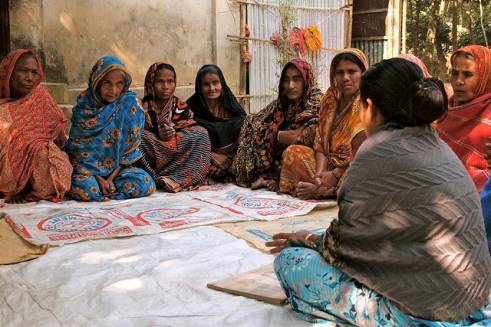By Anders Hylander and Sarah Marzouk
On Wednesday 6 November, HelpAge, Sightsavers, Alzheimer’s Disease International and ADD International are hosting an event at the House of Commons in London to highlight their joint “We can also make change” research.
The research is the outcome of the Voices of the Marginalised project which aims to bring the perspectives of the poorest – specifically people with disabilities, older people and people with mental health issues – into the post-2015 debate.
It is also part of the global Participate project coordinated by the Institute of Development Studies (IDS) and Beyond 2015, which provides high quality evidence on the reality of poverty at ground level.
Testimony to equality and poverty challenges
The stories tell of the experiences of older people and people with disabilities in Bangladesh, at one moment in time, providing valuable testimony of the considerable equality and poverty challenges they face – in particular in securing livelihoods, accessing public services, living free of discrimination, bullying, harassment and violence and accessing justice.
The stories were gathered during 2012-13 using participatory research, where older people and people with disabilities were trained to collect and analyse stories from their peers.
Findings show bullying and violence
The findings from the report show that bullying and violence are everyday experiences, work and dignity are rare and public services are inaccessible. To address these shocking inequalities, the report calls for global decision-makers to ensure that age and disability are treated as cross-cutting themes in all post-2015 development goals.
At the event, Lipi Rahman from our Affiliate in Bangladesh, Resource Integration Centre (RIC) will talk about her experience as a peer researcher for the project.
Other speakers will also set the research within the context of both the challenges faced by Bangladesh and other developing countries, and discuss what this means for the current negotiation of a replacement framework for the Millennium Development Goals. These include David Hallam, the Prime Minister’s Special Envoy on Post-2015 Development Agenda and Danny Burns, the Head of Participation team at IDS and Co-Director of the Participate project.
A brief based on the research findings has been produced and was shared at the UN General Assembly in New York this September. A fuller report is being finalised.
What can be done?
To address the inequalities highlighted in the report, policymakers must:
- Ratify and implement the UN Convention on the Rights of Persons with Disabilities (CRPD) and support the elaboration of a UN convention on the rights of older people.
- Ensure that age and disability are treated as cross-cutting themes in all post-2015 development goals; and support improved disability and older-person data gathering and analysis mechanisms.
- Promote the full and equal participation of older people and persons with disabilities in social and political life.
What can you do?
- Join the online conversation @helpage and #makechange.
- Download and share the briefing to make the voices of the marginalised heard.
